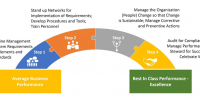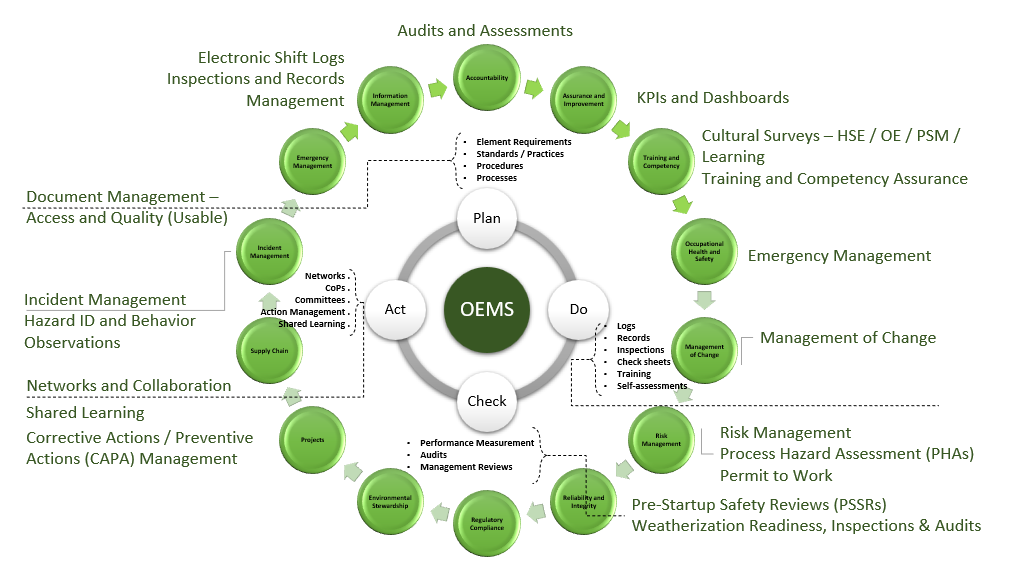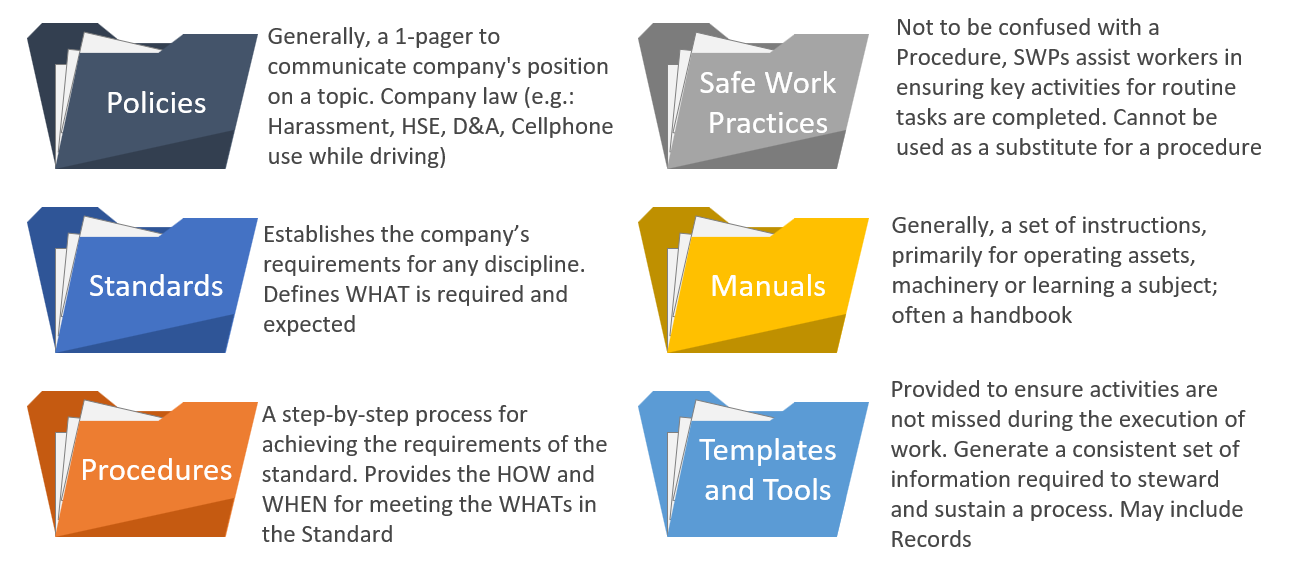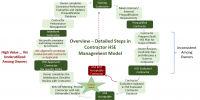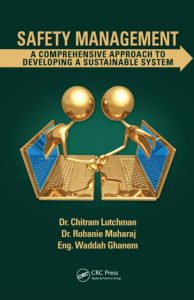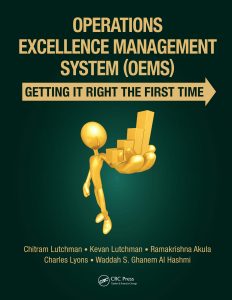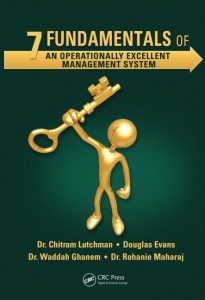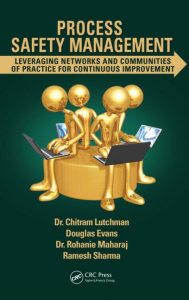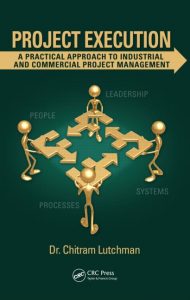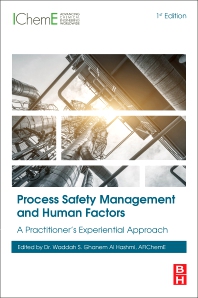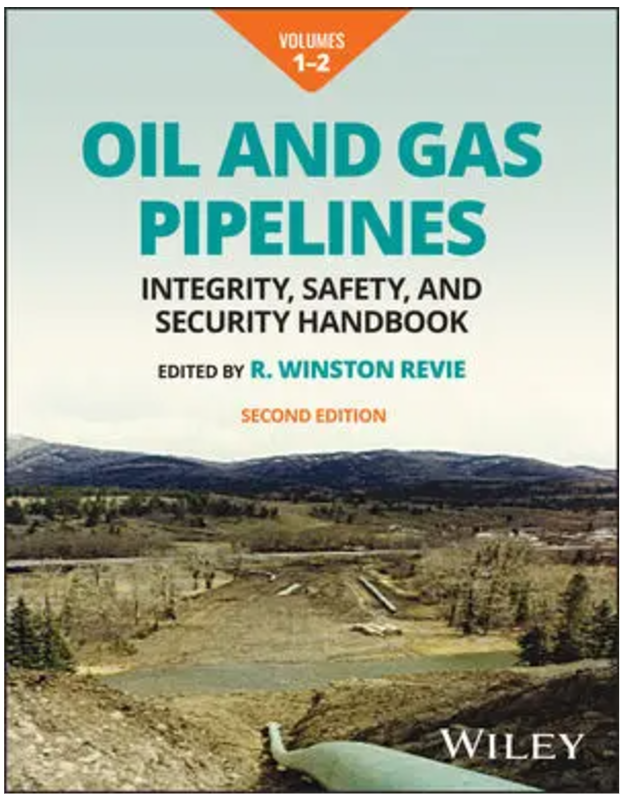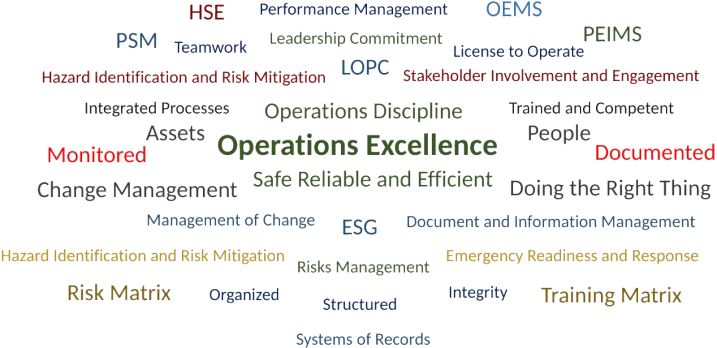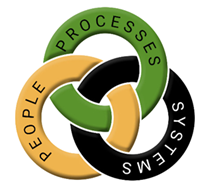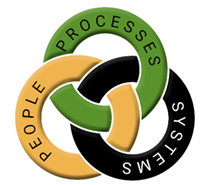Safety Erudite Inc.
Internal Workshops, Conferences And Training
Operations Excellence Management Systems (OEMS)
In the competitive world of business, achieving operational excellence is more than a goal—it’s a necessity. Efficient, streamlined operations are essential for maintaining a competitive edge, maximizing productivity, and ensuring high-quality outputs.
Learn More
Operational Excellence Management Systems (OEMS) – Getting it Right the First Time
In the competitive world of business, achieving operational excellence is more than a goal—it’s a necessity. Safe, reliable efficient and streamlined operations are essential for maintaining a competitive edge, maximizing productivity, and ensuring operations discipline and excellence. Our Operational Excellence Management Systems (OEMS) training is designed to provide your team with the tools and knowledge generate safe, reliable and efficient business performance and ultimate excellence.
Importance – Operational Excellence
Operational excellence involves continuous improvement and the pursuit of perfection in processes. It requires a strategic approach to process optimization, waste reduction, and quality management. By focusing on these areas, organizations can enhance efficiency, improve customer satisfaction, and achieve sustainable growth.
What Our Training Offers
Our OEMS training covers critical elements essential for operational success. Participants will gain hands-on experience with best practices and methodologies, including:
- Safety: Leading principles in HSE Management for delivery of safe work.
- Efficient: Techniques for streamlining operations and improving efficiency. Learn how to identify bottlenecks, eliminate redundancies, and enhance workflow. Implementing systems to ensure high-quality outputs. Strategies for minimizing waste and optimizing resource utilization. Discover methods to reduce material waste, energy consumption, and time lost in processes.
- Reliable: We cover methodologies such as Lean, Six Sigma, and Total Quality Management (TQM) to help you achieve consistent quality
Our Operational Excellence Management Systems (OEMS) training equips your team with knowledge and tools to ensure processes are optimized, waste is reduced, and quality is maintained.
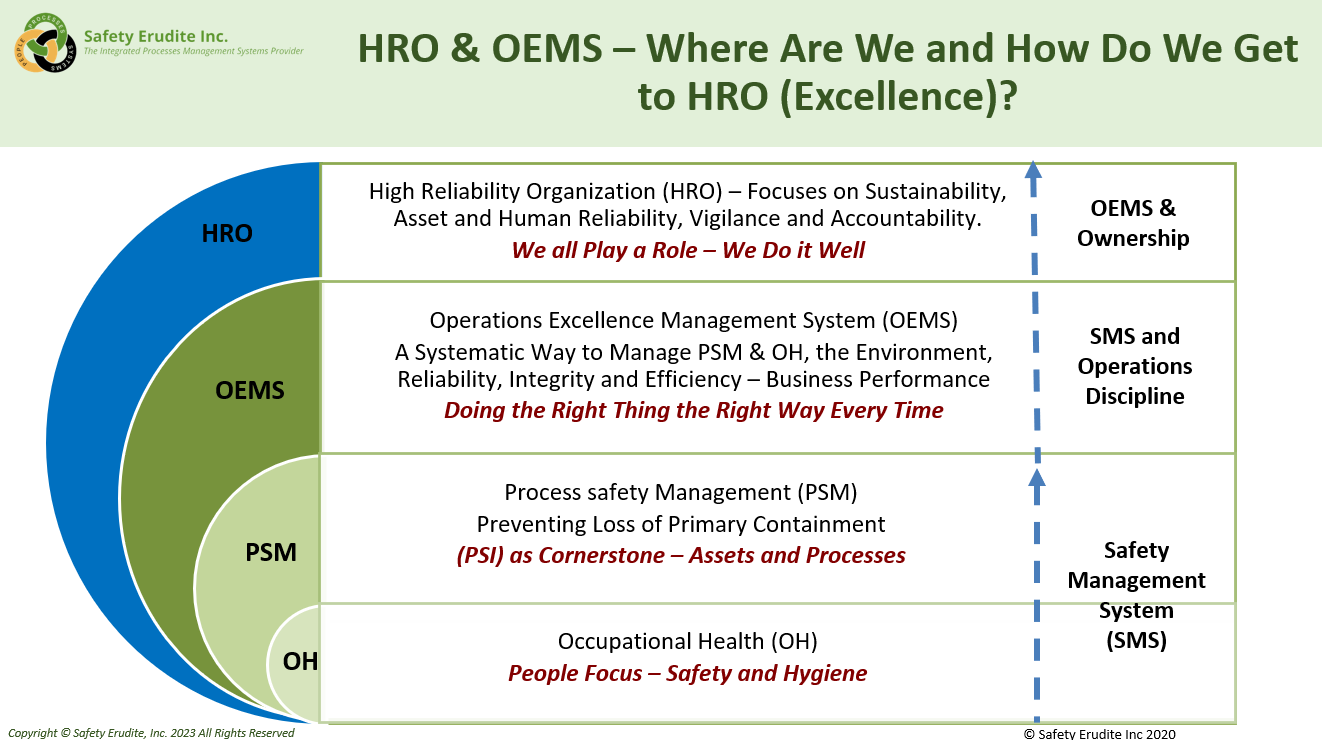
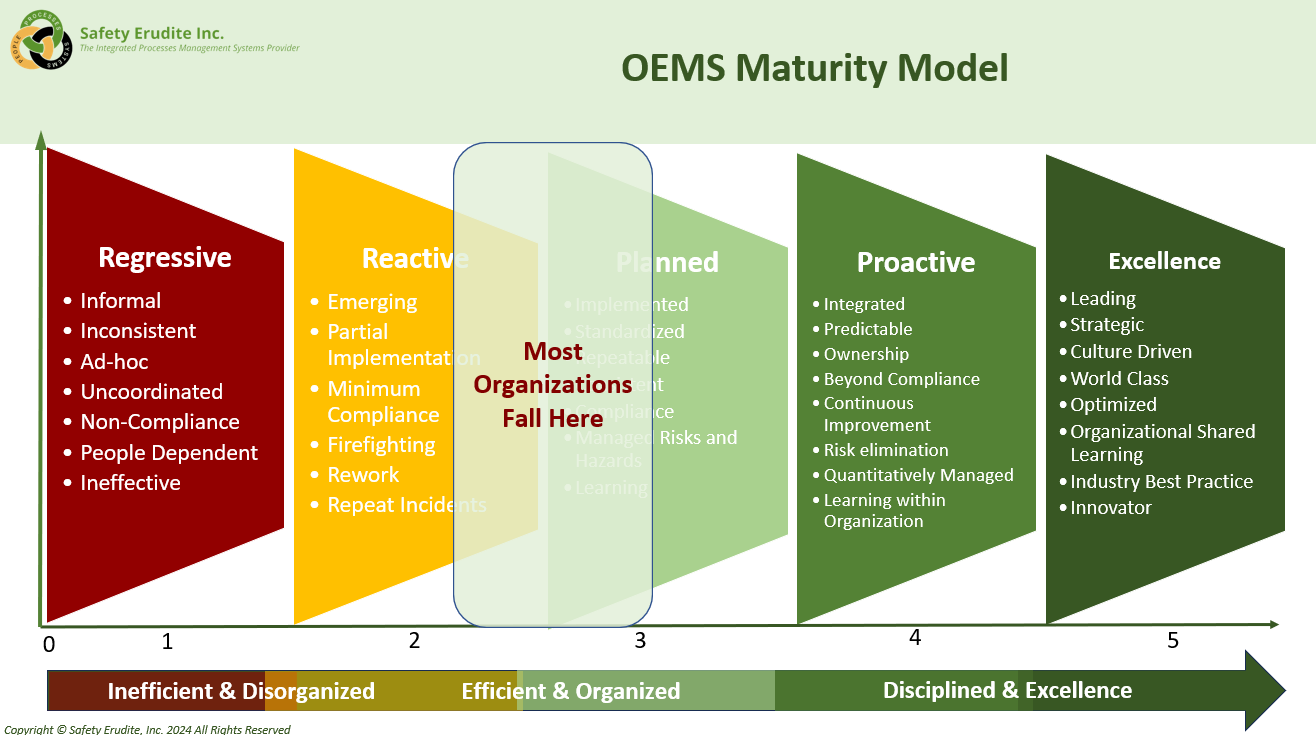
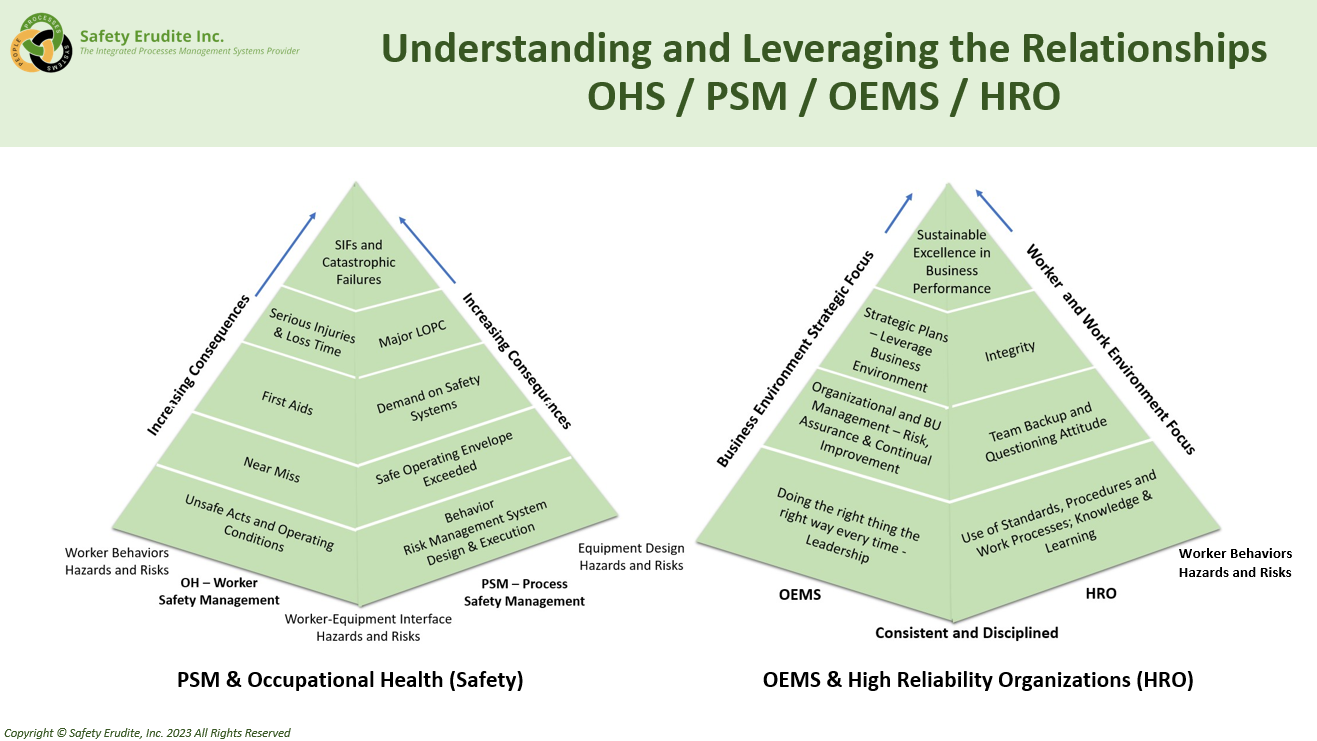
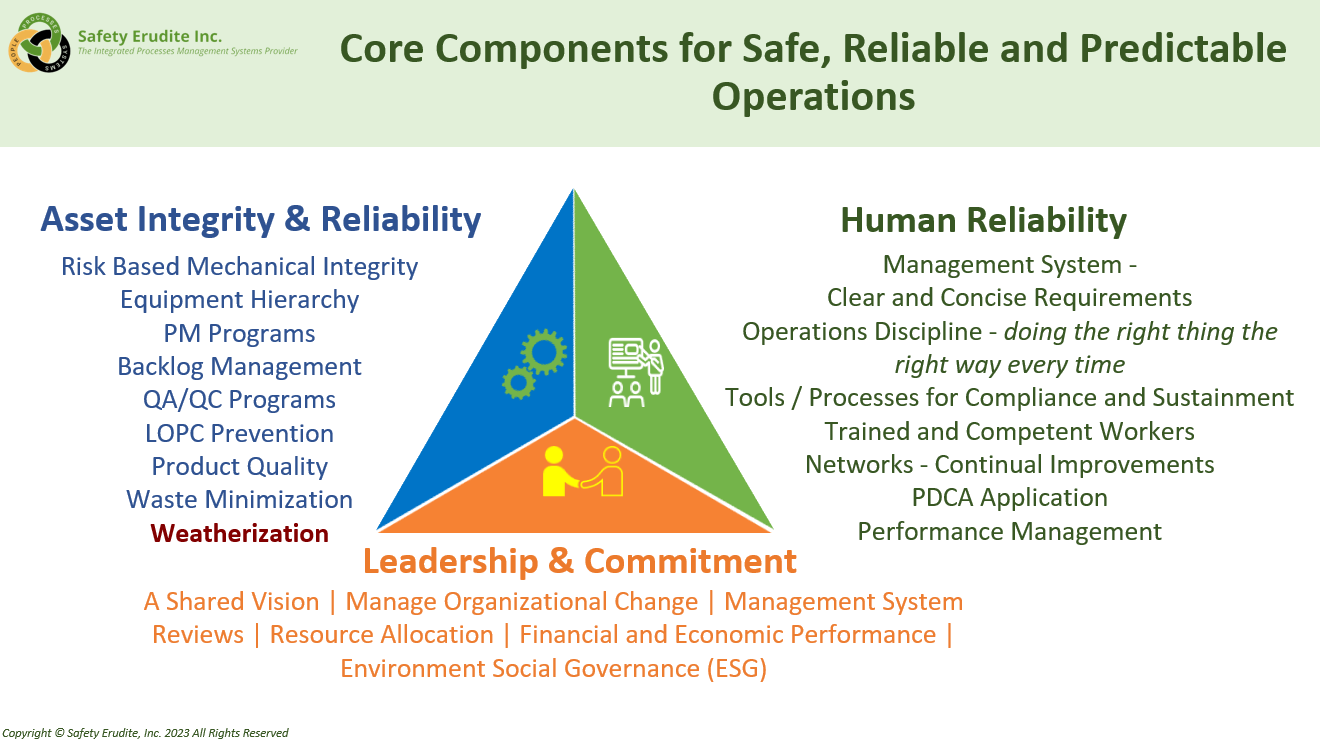
Process Safety Management (PSM)
Effective Process Safety Management (PSM) is crucial for identifying, analyzing, and mitigating potential hazards to protect your workforce and ensure compliance with safety regulations.
Learn More
Process Safety Management (PSM)
Safety is paramount in any industrial or operational setting. Effective Process Safety Management (PSM) is crucial for identifying, analyzing, and mitigating potential hazards to protect your workforce and ensure compliance with safety regulations. Our comprehensive PSM training emphasizes integrating safety into every aspect of your operations.
Importance – Process Safety Management
Process Safety Management involves creating and maintaining systems to prevent accidents and manage risks associated with process operations. A robust PSM program helps organizations avoid costly incidents, ensure regulatory compliance, and protect both employees and the environment.
What Our PSM Training Includes
Our PSM training program covers essential components necessary for effective safety management:
- Hazard Identification: Learn methods for recognizing and evaluating potential safety hazards. Effective hazard identification is the first step in managing and mitigating risks.
- Risk Management: Implement safety measures and controls to address identified hazards. Discover techniques for managing risks and ensuring a safe working environment.
- Asset Reliability and Integrity Management – Preventing LOPCs from a robust integrity management program such as PEIMS / PIMS / POMS. Understand and adhere to industry regulations and standards. Stay compliant with safety laws and avoid legal issues by following best practices.
Integrating robust safety practices into your operations protects your workforce, reduces the risk of incidents, and ensures compliance with safety standards. A strong PSM program not only enhances safety but also contributes to operational efficiency and regulatory compliance. Contact us today to learn more about our PSM training and how it can enhance safety in your organization.
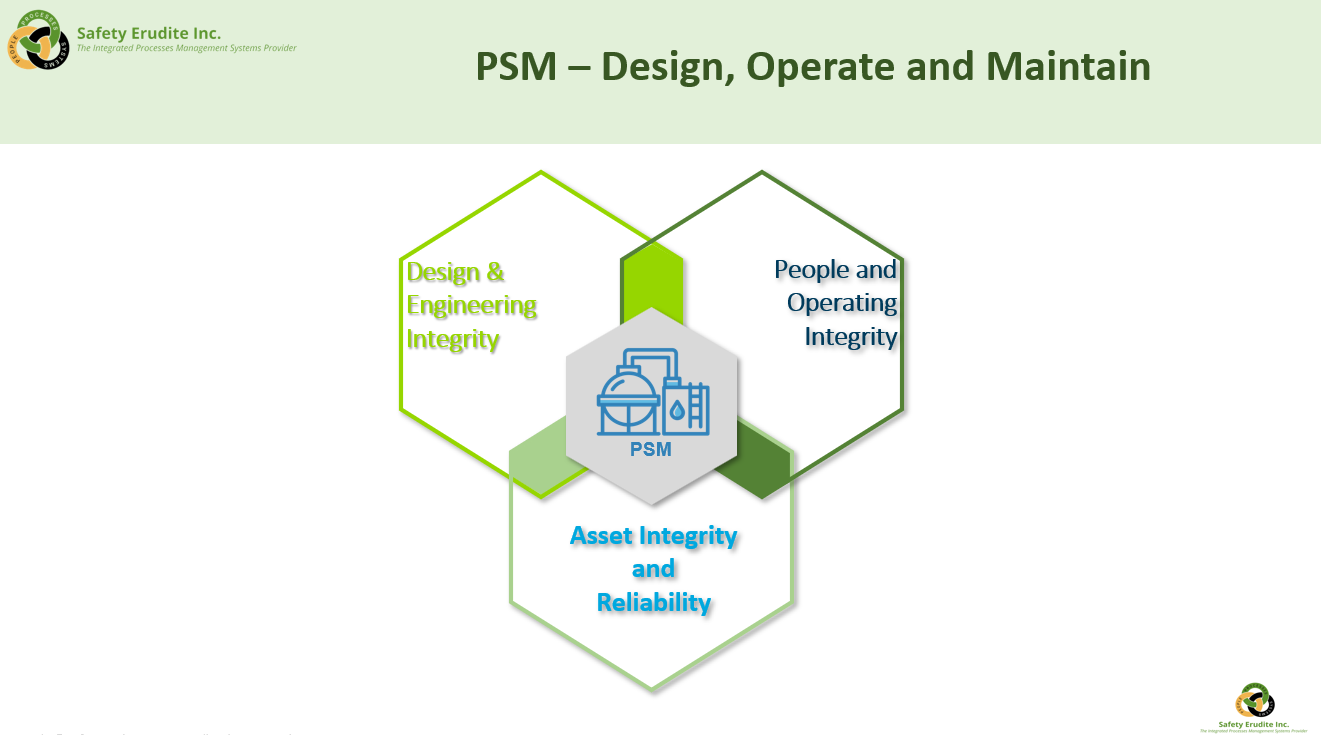
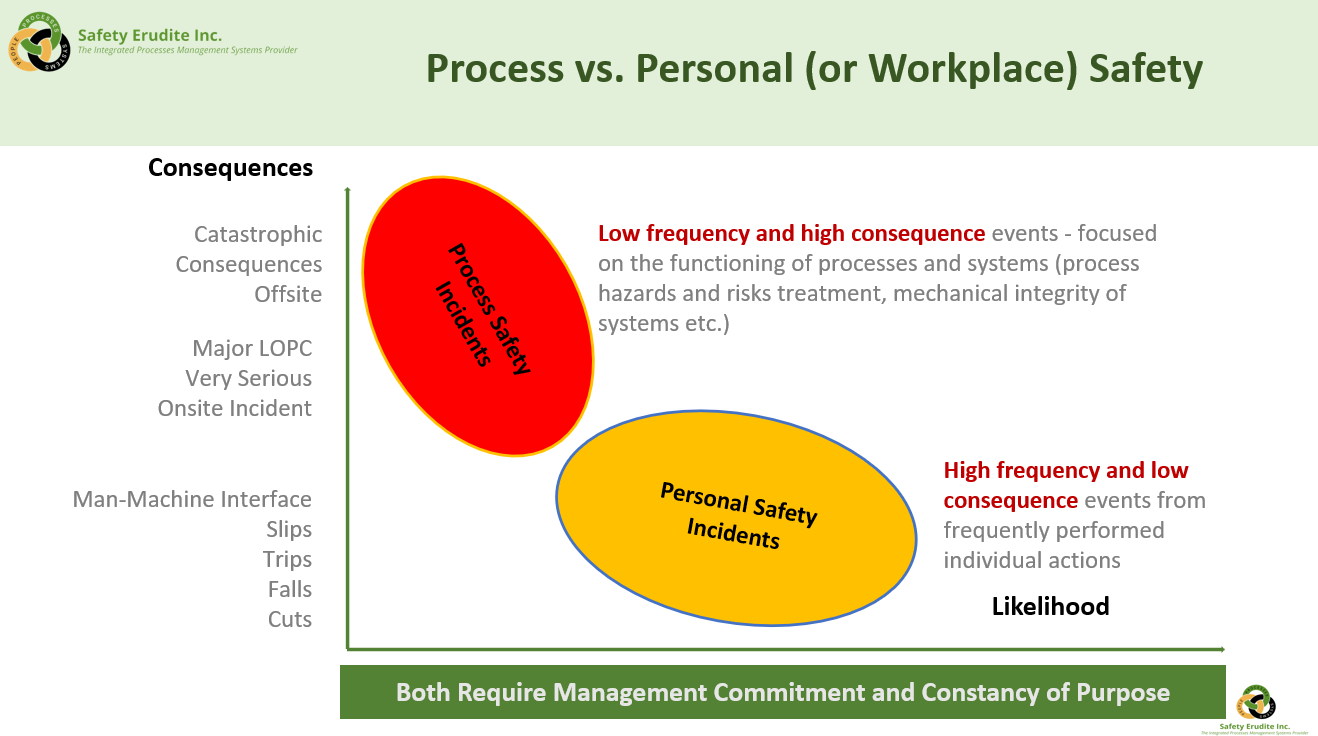

Contractor Safety Management – Driving Sustainability
Contractor Safety Management focuses on ensuring that external partners meet your safety expectations, driving sustainable performance and maintaining a culture of safety.
Learn More
Contractor Safety Management – Driving Sustainability
Managing safety across a diverse contractor base is essential for maintaining high standards throughout your operations. Contractor Safety Management focuses on ensuring that external partners meet your safety expectations, driving sustainable performance and maintaining a culture of safety.
Importance – Contractor Safety Management
Contractors play a vital role in many organizations, and ensuring their adherence to safety standards is crucial. Effective contractor safety management helps prevent accidents, ensures compliance with safety protocols, and maintains overall safety performance.
Our Approach to Contractor Safety Management
Our contractor safety management services are designed to integrate seamlessly with your existing safety management systems. Here’s how we approach contractor safety:
- Contractor Evaluation and Selection: Selecting the safest and most capable. Assess safety practices and compliance before engaging with contractors. Ensure that potential contractors meet your safety standards and expectations.
- Integration and Performance Management: Incorporate contractor safety protocols with your existing safety management systems. Ensure that all parties follow consistent safety practices and procedures.
- Continuous Improvement: Monitor and enhance contractor performance through regular reviews and feedback. Foster a culture of continuous improvement to maintain high safety standards.
Prioritizing contractor safety fosters a culture of shared responsibility and ensures that all parties involved are committed to maintaining high safety standards. Effective contractor safety management enhances overall safety performance and contributes to a safer, more efficient operation. Contact us today to explore our contractor safety management services and ensure that your external partners meet your safety expectations.
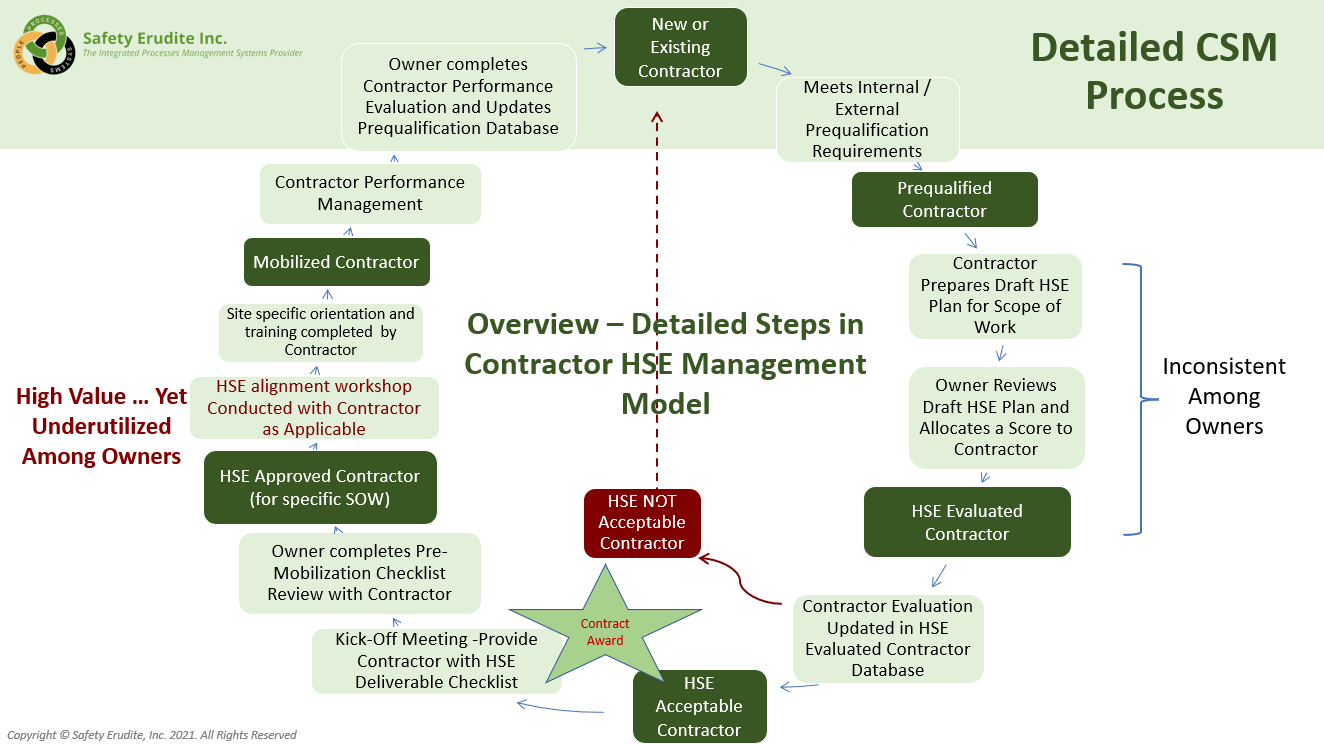
Leadership Behaviors and Leadership Styles – Finding Your Leadership Style
Leadership is a critical component of organizational success. The ability to inspire, guide, and manage teams effectively can make the difference between thriving and merely surviving in today’s competitive landscape.
Learn More
Leadership Behaviors and Leadership Styles
Leadership is a critical component of organizational success. The ability to inspire, guide, and manage teams effectively can make the difference between thriving and merely surviving in today’s competitive landscape. At Safety Erudite, we understand that leadership is not a one-size-fits-all approach. That’s why we offer specialized workshops focused on Leadership Behaviors and Leadership Styles, designed to help individuals uncover and refine their unique leadership style.
Importance – Leadership Behaviors and Styles
Leadership styles significantly impact team dynamics, productivity, and overall organizational culture. A leader’s approach can influence everything from employee motivation to strategic decision-making. Understanding different leadership styles and identifying the one that best fits your personal strengths and team needs is crucial for maximizing your effectiveness.
Our Tailored Workshops
Our workshops are structured to cater to various levels of leadership experience, from emerging leaders to seasoned executives. Each session is designed to be interactive and engaging, providing participants with a deep dive into different leadership styles and tools. Here are some examples of what you can expect:
- Transformational Leadership: This style focuses on inspiring and motivating teams to achieve exceptional results. Transformational leaders foster an environment of enthusiasm and innovation, encouraging team members to go above and beyond.
- Transactional Leadership: Emphasizing structure and order, transactional leadership involves managing teams through rewards based on performance. It’s ideal for maintaining routine processes and achieving specific, measurable outcomes.
- Servant Leadership: This approach prioritizes the needs and development of team members. Servant leaders aim to serve their teams, fostering a supportive and collaborative environment that enhances overall team performance.
- Self-Assessment Tools: Participants will use advanced tools to evaluate their current leadership style and its effectiveness. This self-assessment helps in understanding personal leadership strengths and areas for improvement.
- Practical Application Strategies: Learn actionable strategies for applying your leadership style in real-world scenarios. These strategies are designed to enhance team engagement, performance, and satisfaction.
- Personalized Development Plan: Develop a customized plan for continuous growth and adaptation of your leadership style. This plan will guide you in refining your approach and achieving your leadership goals.
Uncovering your leadership style not only enhances your effectiveness but also contributes to creating a positive and productive work environment. Leaders who understand their own style and how it fits with their team’s needs are better equipped to drive success and foster a collaborative workplace. Investing in your leadership development is an investment in the future success of your team and organization. Join us to unlock your true leadership potential and transform your approach to leadership. Contact us today to learn more about our workshops and start your journey toward becoming a more effective leader.

HSE Plans Development for Major Projects
Large-scale projects require meticulous planning, particularly concerning health, safety, and environmental (HSE) considerations. HSE Plans Development services ensure that your major projects are supported by comprehensive and effective HSE plans, safeguarding success and compliance
Learn More
HSE Plans Development for Major Projects
Large-scale projects require meticulous planning, particularly concerning health, safety, and environmental (HSE) considerations. HSE Plans Development services ensure that your major projects are supported by comprehensive and effective HSE plans, safeguarding success and compliance.
Importance – HSE Plans in Major Projects
Effective HSE planning is critical for managing risks and ensuring compliance with regulatory requirements in large projects. A well-developed HSE plan addresses potential risks, outlines safety procedures, and ensures that all project aspects are managed with safety in mind.
Our HSE Plans Development Services
Our services focus on creating detailed HSE plans tailored to your project’s specific needs. Here’s what we offer:
- Risk Assessment: Identify potential HSE risks associated with the project. Comprehensive risk assessments help in understanding and mitigating potential hazards.
- Plan Development: Develop detailed HSE plans that address identified risks and compliance requirements associated with the project scope of work. Our plans are designed to guide your project through every stage, ensuring safety and compliance.
- Implementation Support: Assist with the execution of HSE plans and monitor adherence. Ensure that the HSE plans are effectively implemented and followed throughout the project lifecycle.
Investing in comprehensive HSE plans for major projects is essential for safeguarding success, ensuring regulatory compliance, and protecting your workforce. Effective HSE planning enhances project outcomes and contributes to overall operational excellence. Contact us today to learn more about our HSE plans development services and ensure the success of your major projects.

Incident Management and Root Cause Analyses
When incidents occur, understanding their root causes is crucial for preventing future occurrences. Our Incident Management and Root Cause Analyses training provides the tools and methodologies needed to investigate and address incidents effectively, turning challenges into opportunities for improvement.
Learn More
Incident Management and Root Cause Analyses
When incidents occur, understanding their root causes is crucial for preventing future occurrences. Our Incident Management and Root Cause Analyses training provides the tools and methodologies needed to investigate and address incidents effectively, turning challenges into opportunities for improvement.
Importance – Incident Management
Effective incident management involves investigating and analyzing incidents to identify their underlying causes. This approach helps organizations prevent future occurrences, improve processes, and enhance overall safety and performance.
What Our Training Offers
Our training program equips participants with essential skills for incident management and root cause analysis. Here’s what you’ll learn:
- Incident Investigation Techniques: Methods for collecting and analyzing data related to incidents. Learn how to gather evidence, interview witnesses, and document findings effectively.
- Root Cause Analysis: Techniques for identifying underlying issues that contributed to the incident. Understand how to analyse data, identify patterns, and determine root causes.
- Corrective Actions: Develop and implement effective solutions to prevent recurrence. Learn how to create action plans, monitor implementation, and ensure that corrective measures are effective.
Mastering incident management and root cause analyses is crucial for turning challenges into opportunities for growth. Effective incident investigation and analysis lead to improved processes, enhanced safety, and a culture of continuous improvement. Contact us today to learn more about our training and start transforming your approach to incident management.
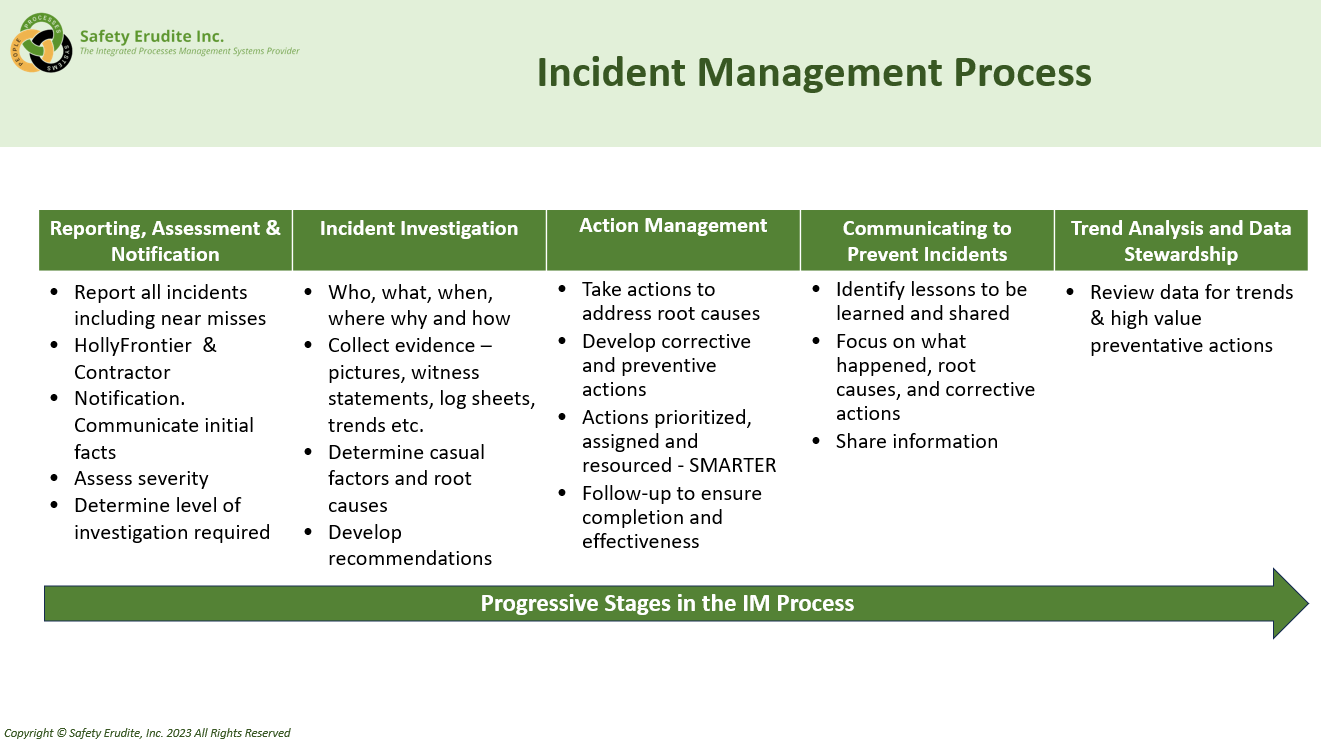
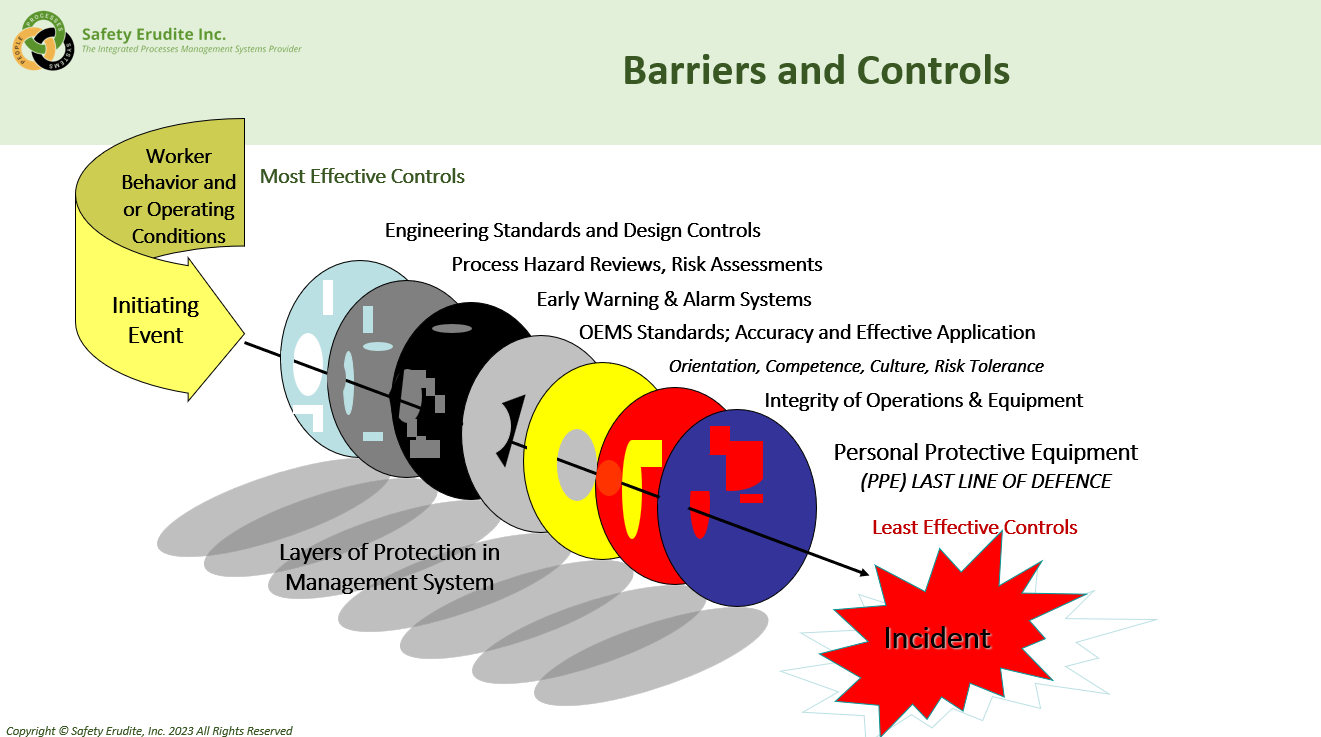
Frontline Supervisor Safety Training– Leading HSE at the Frontline
Frontline supervisors play a crucial role in enforcing safety standards and leading by example. Our Frontline Supervisor Safety Training is designed to equip these key individuals with the skills needed to manage health, safety, and environmental (HSE) standards effectively and drive a culture of safety.
Learn More
Frontline Supervisor Safety Training
Frontline supervisors play a crucial role in enforcing safety standards and leading by example. Our Frontline Supervisor Safety Training is designed to equip these key individuals with the skills needed to manage health, safety, and environmental (HSE) standards effectively and drive a culture of safety.
Importance – Frontline Supervisors in Safety Management
Frontline supervisors are responsible for implementing and upholding safety standards on the ground. Their leadership and management skills are essential for ensuring that safety practices are followed, risks are managed, and a culture of safety is maintained.
What Our Training Covers
Our Frontline Supervisor Safety Training focuses on developing essential skills for leading safety initiatives. Here’s what participants will learn:
- Safety Leadership: Develop skills to lead and influence safety practices within teams. Learn how to motivate employees, set safety expectations, and model safe behaviors.
- Risk Management: Techniques for identifying and addressing safety hazards on the ground. Learn how to assess risks, implement control measures, and respond to safety issues effectively.
- Communication: Strategies for effectively communicating safety expectations and fostering a culture of safety. Enhance your ability to convey safety messages, provide feedback, and engage team members in safety initiatives.
- Key Benefits of Frontline Supervisor Safety Training
- Enhanced Safety Leadership: Equip supervisors with the skills to lead safety initiatives and influence team safety practices effectively.
- Effective Risk Management: Learn techniques for identifying and managing safety hazards to ensure a safe working environment.
- Strong Safety Culture: Foster a culture of safety through effective communication and leadership. Promote a proactive approach to safety within your team.
Why Invest in Supervisor Safety Training
Empowering frontline supervisors with safety training is essential for maintaining high safety standards and driving a culture of safety within your organization. Effective safety leadership and management contribute to a safer work environment and improved overall safety performance. Contact us today to learn more about our Frontline Supervisor Safety Training and enhance your team’s approach to safety.
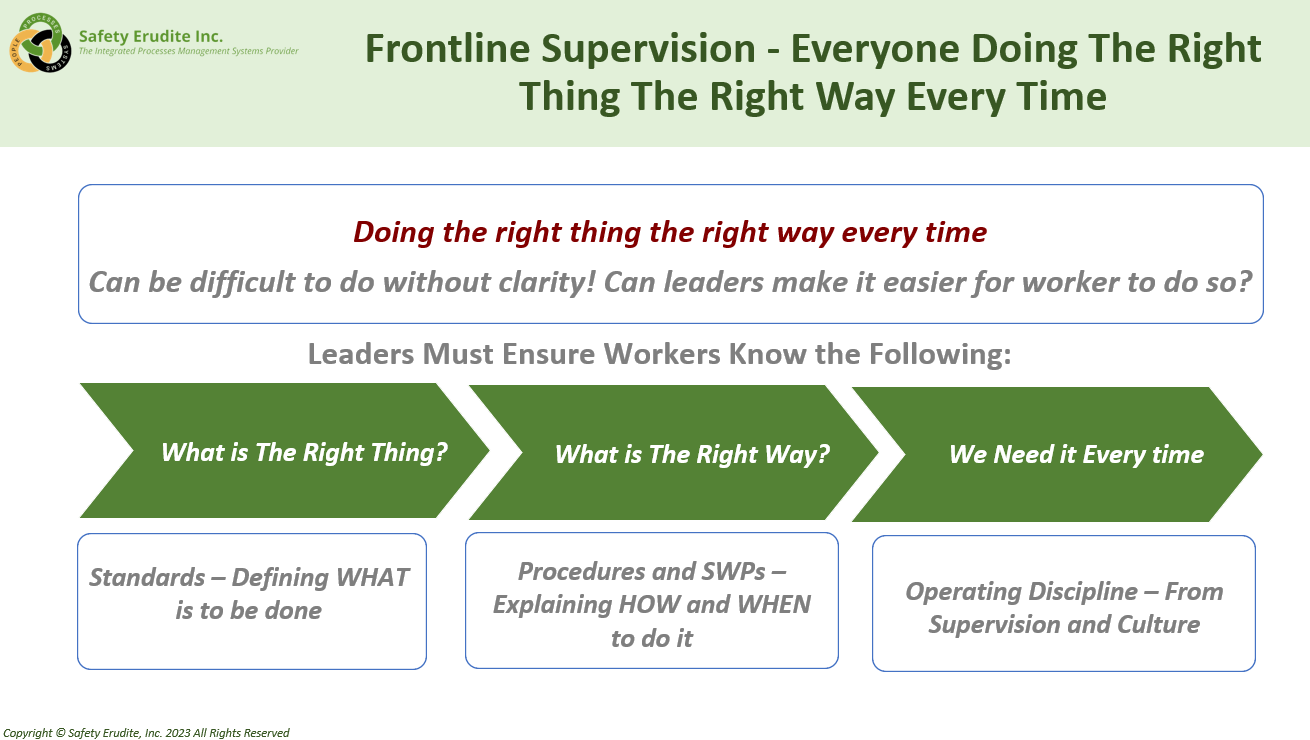
Process Operator Training
Effective process operators are vital for maintaining operational efficiency and safety. Our Process Operator Training provides comprehensive education on the principles and practices of process operations, equipping operators with the skills needed for optimal performance.
Learn More
Process Operator Training
Effective process operators are vital for maintaining operational efficiency and safety. Our Process Operator Training provides comprehensive education on the principles and practices of process operations, equipping operators with the skills needed for optimal performance.
Importance – Process Operators Competence
Process operators are responsible for managing and controlling process operations, ensuring that equipment runs efficiently, and maintaining safety standards. Their expertise is crucial for achieving operational excellence and preventing disruptions.
What Our Training Includes
Our Process Operator Training covers essential topics to build expertise in process operations. Here’s what participants will learn:
- Operational Procedures: Understanding and applying standard operating procedures (SOPs) for equipment and processes. Learn how to follow procedures accurately and ensure consistent operations.
- Safety Protocols: Learning to manage processes safely and respond to potential issues. Discover techniques for handling emergencies, preventing accidents, and ensuring a safe working environment.
- Efficiency Techniques: Strategies for optimizing process performance and minimizing downtime. Learn how to improve efficiency, reduce waste, and enhance overall operational performance.
Investing in process operator training is essential for maintaining operational efficiency and safety. Skilled operators contribute to smooth operations, reduced downtime, and a safer work environment. Contact us today to learn more about our Process Operator Training and build expertise within your team.
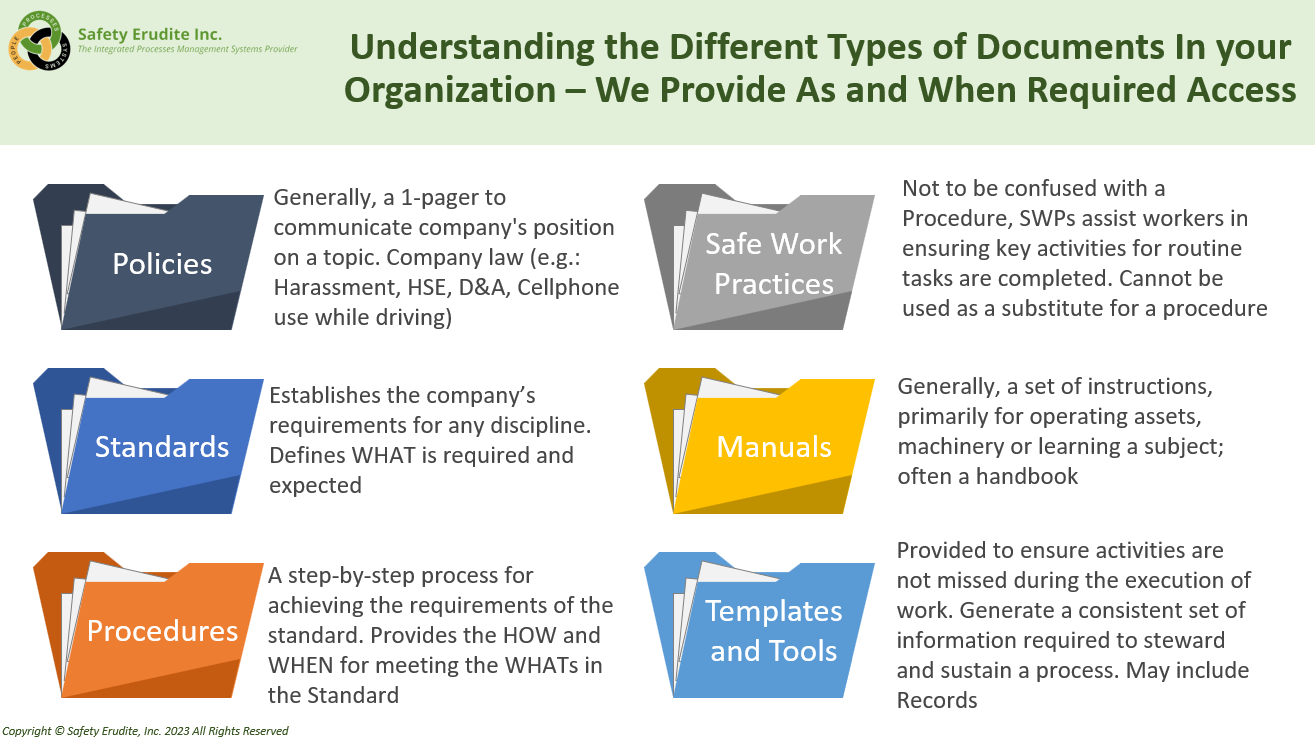

Operator Driven Reliability (ODR)
Reliability is a key factor in operational success. Operator Driven Reliability (ODR) training emphasizes the critical role of operators in maintaining and enhancing equipment and process reliability, leveraging their insights for continuous improvement.
Learn More
Operator Driven Reliability (ODR)
Reliability is a key factor in operational success. Operator Driven Reliability (ODR) training emphasizes the critical role of operators in maintaining and enhancing equipment and process reliability, leveraging their insights for continuous improvement.
Importance – Operator Driven Reliability
Operators are on the front lines of process operations and have valuable insights into equipment performance and potential reliability issues. Leveraging their observations and feedback is crucial for enhancing equipment reliability and overall operational performance.
What Our ODR Training Focuses On
Our ODR training provides participants with the tools and techniques needed to harness operator insights for improved reliability. Here’s what you’ll learn:
Insight Utilization: Leverage operators’ firsthand knowledge and observations to identify reliability issues. Learn how to collect and use operator feedback to improve equipment performance.
Reliability Practices: Implement best practices and preventive measures to enhance equipment reliability. Discover strategies for maintaining equipment, preventing failures, and ensuring optimal performance.
Continuous Improvement: Encourage a proactive approach to reliability through ongoing feedback and process adjustments. Foster a culture of continuous improvement to enhance overall operational performance.
Harnessing operator insights for improved reliability is essential for maintaining equipment performance and achieving operational excellence. ODR training helps organizations leverage valuable feedback, enhance reliability, and drive continuous improvement. Contact us today to learn more about our ODR training and optimize your equipment reliability.
Technical Writing – Creating Usable Documents (Writing for Users)
Effective technical writing is crucial for ensuring that documents are informative and practical for users. Our Technical Writing workshops focus on crafting clear, concise, and user-friendly documents, enhancing the usability of your technical documentation.
Learn More
Technical Writing – Creating Usable Documents (Writing for Users)
Effective technical writing is crucial for ensuring that documents are informative and practical for users. Our Technical Writing workshops focus on crafting clear, concise, and user-friendly documents, enhancing the usability of your technical documentation.
Importance – Usable Technical Documentation
Clear and effective technical documentation is essential for conveying complex information in a way that is easy to understand and use. Well-written documents improve user comprehension, facilitate efficient operations, and enhance overall communication.
What Our Technical Writing Workshops Cover
Our workshops focus on developing skills for creating high-quality technical documentation. Here’s what participants will learn:
- Document Structure: Techniques for organizing information logically and effectively. Learn how to structure documents for clarity and ease of use.
- Clear Writing Techniques: Strategies for writing clearly and concisely. Discover methods for avoiding jargon, simplifying language, and enhancing readability.
- User-Centric Design: Understanding the needs of your audience and tailoring documents accordingly. Learn how to create documentation that meets user requirements and enhances usability.
Investing in technical writing training is essential for creating clear and effective documentation that enhances communication and usability. Our workshops provide the skills needed to craft high-quality documents that improve user understanding and support operational efficiency. Contact us today to learn more about our technical writing workshops and enhance your documentation practices.
Networks and Centres of Excellence - Setting Them Up Right
Establishing robust networks and centres of excellence is key to driving innovation and best practices within your organization. Our services in Networks and Centres of Excellence provide guidance on setting up these valuable structures to foster collaboration, enhance expertise, and drive continuous improvement.
Learn More
Networks and Centres of Excellence – Setting Them Up Right
Establishing robust networks and centres of excellence is key to driving innovation and best practices within your organization. Our services in Networks and Centres of Excellence provide guidance on setting up these valuable structures to foster collaboration, enhance expertise, and drive continuous improvement.
Importance – Networks and Centres of Excellence
Networks and centres of excellence (CoEs) serve as hubs for knowledge sharing, innovation, and best practices within an organization. They bring together experts and resources to tackle specific challenges, drive innovation, and promote organizational learning.
What Our Services Offer
Our approach to setting up networks and centres of excellence focuses on creating effective structures and ensuring their long-term success. Here’s what we provide:
- Design and Framework: Develop the right structure and goals for your network or CoE. Tailor the design to meet your organization’s needs and objectives, ensuring alignment with strategic goals.
- Knowledge Sharing: Facilitate the exchange of best practices, insights, and expertise among members. Implement processes for effective knowledge management and sharing within the network or CoE.
- Sustainability: Ensure that the network or CoE remains effective and continues to add value over time. Develop strategies for maintaining engagement, evaluating impact, and adapting to changing needs.
Investing in networks and centres of excellence is crucial for driving innovation, enhancing expertise, and promoting best practices within your organization. Effective networks and CoEs contribute to overall organizational success by fostering collaboration and continuous improvement. Contact us today to learn more about setting up networks and centres of excellence and unlocking their potential for your organization.
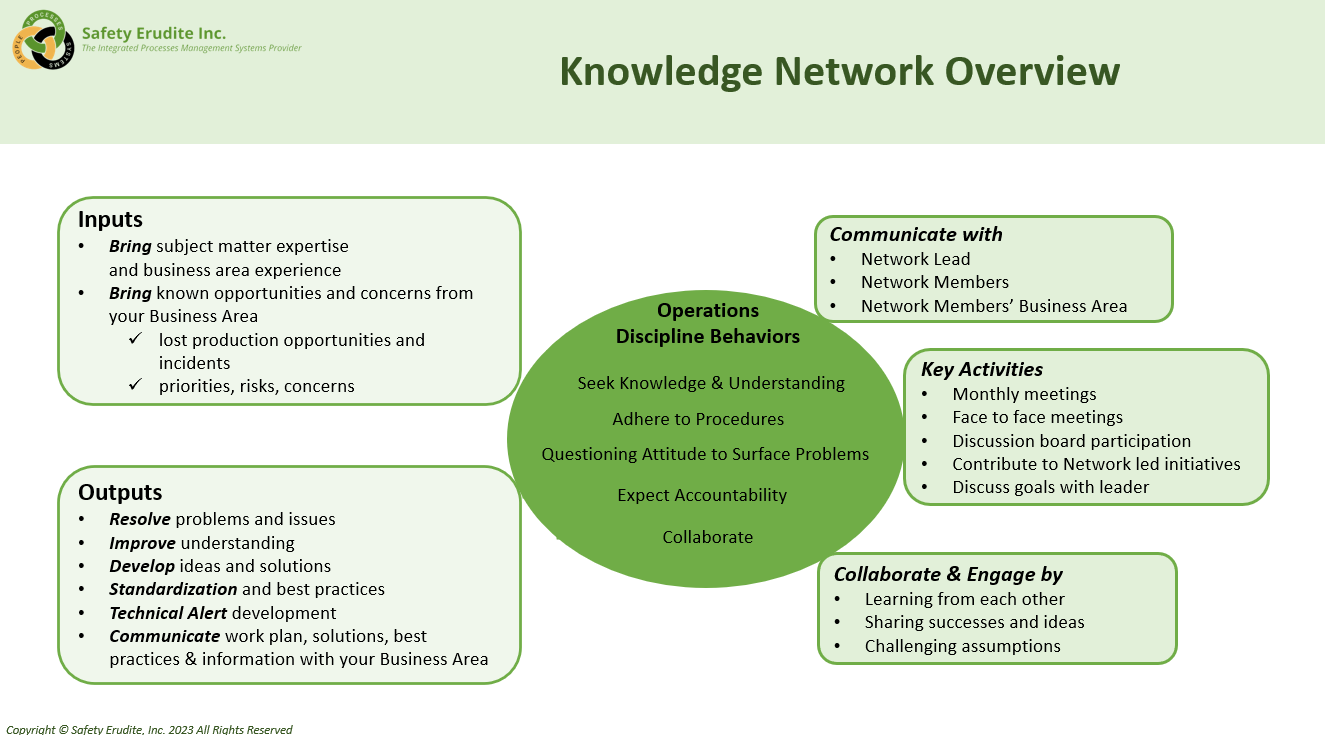
Walk the Line - Preventing LOPCs
Loss of Primary Containment (LOPC) incidents can have severe consequences for safety and operations. Our Walk the Line training focuses on preventing such occurrences through rigorous adherence to containment practices, ensuring that your operations remain safe and compliant.
Learn More
Walk the Line – Preventing LOPCs
Loss of Primary Containment (LOPC) incidents can have severe consequences for safety and operations. Our Walk the Line training focuses on preventing such occurrences through rigorous adherence to containment practices, ensuring that your operations remain safe and compliant.
Importance – Understanding LOPC Risks
LOPC incidents occur when there is a failure in the primary containment system, leading to the release of hazardous substances. These incidents can result in safety hazards, environmental damage, and operational disruptions. Preventing LOPCs is crucial for maintaining a safe and efficient operation.
What Our Training Covers
Our Walk the Line training program provides comprehensive education on preventing LOPC incidents. Here’s what you’ll learn:
- LOPC Prevention: Identify potential risks and implement preventive measures. Understand the factors that contribute to LOPC incidents and learn how to mitigate these risks.
- Containment Protocols: Ensure that procedures for maintaining containment are followed strictly. Learn about best practices for equipment maintenance, inspection, and monitoring to prevent containment failures.
- Incident Response: Prepare for and manage any potential containment breaches effectively. Develop response strategies to address LOPC incidents promptly and minimize their impact.
Preventing LOPC incidents is essential for maintaining a safe and compliant operation. Effective containment practices help safeguard your workforce, protect the environment, and ensure operational continuity. Contact us today to learn more about our Walk the Line training and enhance your LOPC prevention efforts.
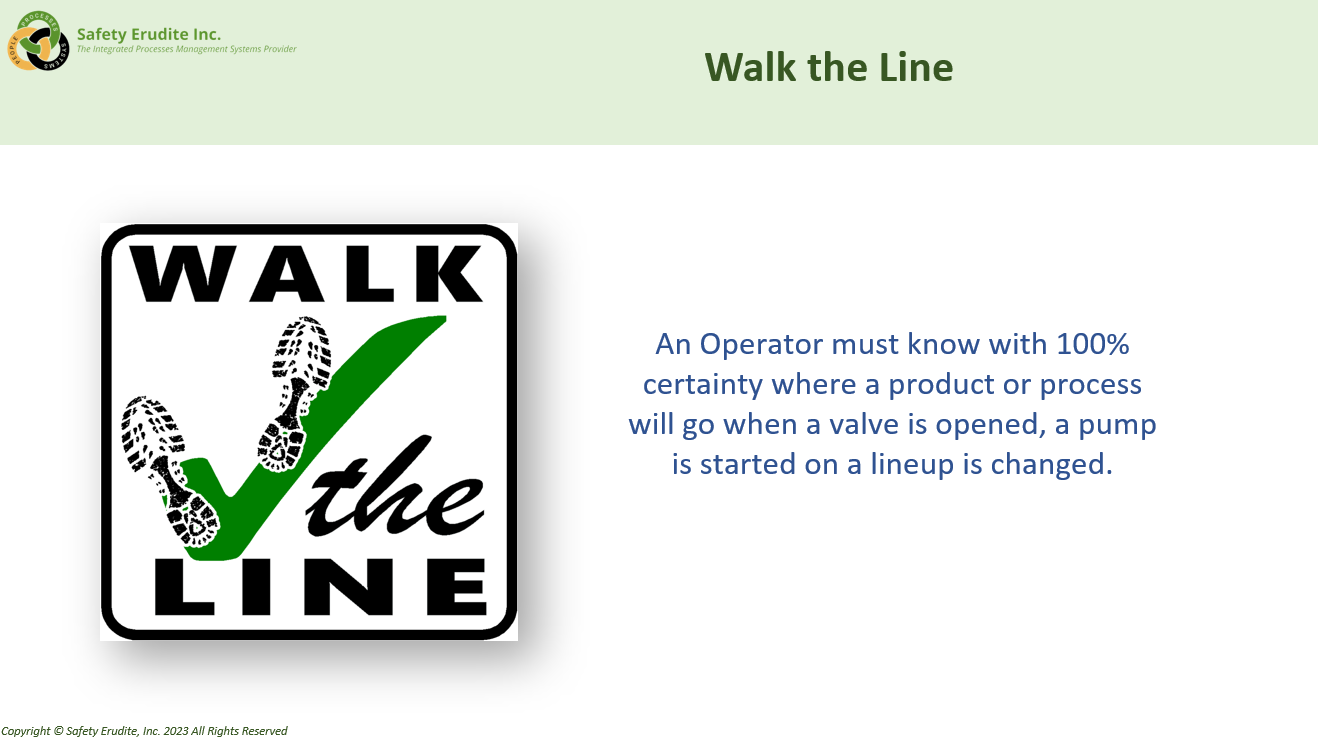
Hazard Identification and Risk Management – Projects, Operations, and Enterprise
Effective hazard identification and risk management are essential for maintaining safety and operational integrity across projects, operations, and enterprise-wide activities. Our training in Hazards Identification and Risk Management provides a comprehensive approach to managing these critical aspects, helping your organization build resilience and achieve high safety standards.
Learn More
Hazard Identification and Risk Management – Projects, Operations, and Enterprise
Effective hazard identification and risk management are essential for maintaining safety and operational integrity across projects, operations, and enterprise-wide activities. Our training in Hazards Identification and Risk Management provides a comprehensive approach to managing these critical aspects, helping your organization build resilience and achieve high safety standards.
Importance – Hazard Identification and Risk Management
Hazard identification and risk management are fundamental for preventing accidents, protecting assets, and ensuring smooth operations. By proactively identifying hazards and managing risks, organizations can maintain safety, comply with regulations, and enhance operational efficiency.
What Our Training Covers
Our Hazards Identification and Risk Management training provides a thorough understanding of essential concepts and practices. Here’s what you’ll learn:
- Hazard Identification: Techniques for identifying potential hazards in various contexts. Learn how to conduct hazard assessments and recognize risks in projects, operations, and enterprise-wide activities.
- Risk Assessment: Methods for assessing and prioritizing risks based on their potential impact. Discover approaches for evaluating risk levels and determining appropriate control measures.
- Mitigation Strategies: Develop and implement strategies to manage and mitigate identified risks. Learn how to create risk management plans, implement controls, and monitor effectiveness.
- Inefficiencies of current training methods – Sheep dipping in traditional training methods that may include:
- Lack of Role Relevance
- Resource Inefficiency
- Inadequate Skill Development
- The Need for a Tailored Approach
Investing in hazard identification and risk management training is essential for building a resilient organization capable of maintaining high safety and operational standards. Our training equips your team with the skills needed to proactively address risks and ensure safety across all aspects of your operations. Contact us today to learn more about our training and enhance your risk management practices.
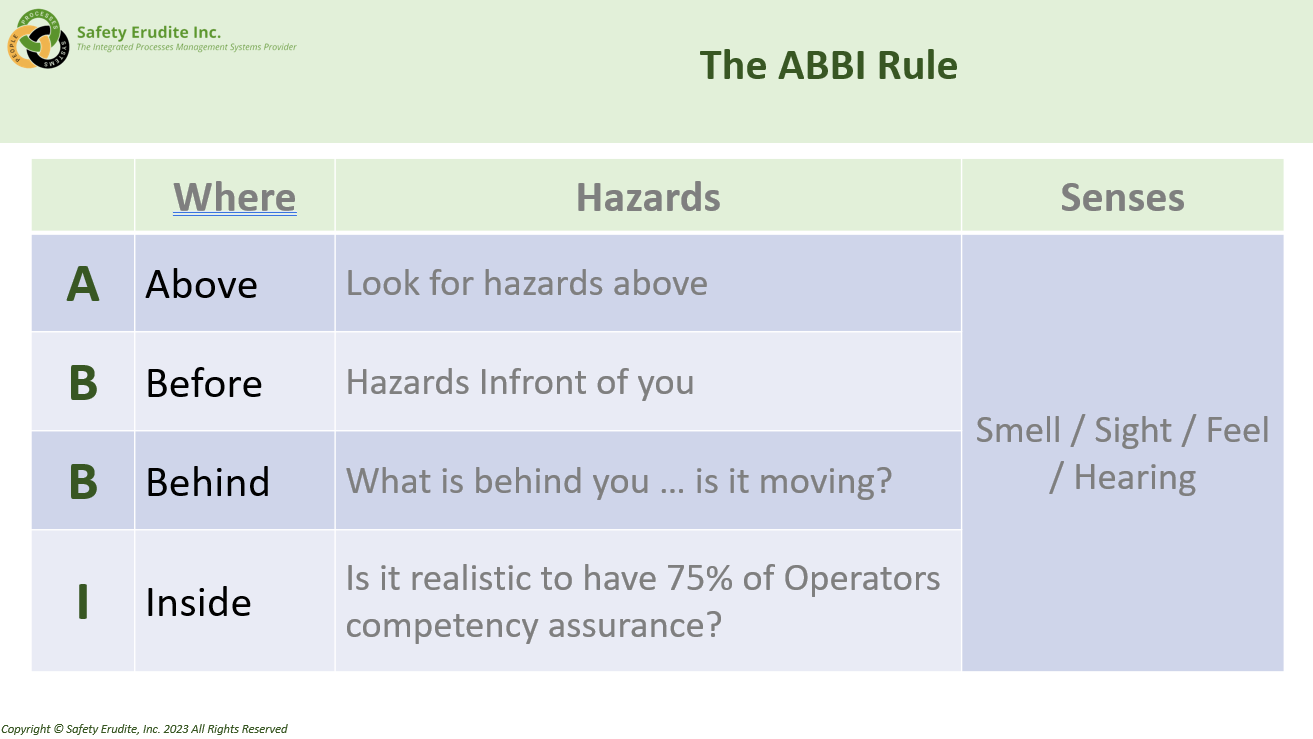
The Integrated Management Systems Provider – EHS, PSM, OEMS
Safety Erudite Inc. is a leading North American provider of Integrated Management Systems for energy and manufacturing industries. We collaborate with clients to implement right-sized Environmental Health and Safety (EHS), Process Safety Management (PSM), and Operations Excellence Management Systems (OEMS)
Contact
Email
customersupport@safetyerudite.com
Office Number
+1(469) 353-9974
Office Address
Canada
112 Sherwood Lane NW Calgary, AB, T3R OV3, Canada
USA
201 Long Canyon Court Richardson TX, 75080, USA

